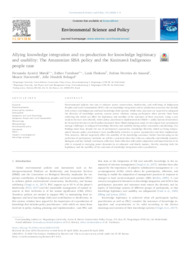Allying knowledge integration and co-production for knowledge legitimacy and usability: The Amazonian SISA policy and the Kaxinawá Indigenous people case.
Allying knowledge integration and co-production for knowledge legitimacy and usability: The Amazonian SISA policy and the Kaxinawá Indigenous people case.
Author(s): MATUK, F. A.; TURNHOUT, E.; FLESKENS, L.; AMARAL, E. F. do; HAVERROTH, M.; BEHAGEL, J. H.
Summary: Environmental policies that aim to enhance nature conservation, biodiversity, and well-being of Indigenous Peoples and Local Communities (IPLC) rely on knowledge integration and co-production processes that include both science and Indigenous and local knowledge (ILK) systems. While these processes are expected to safeguard the diversity of knowledge systems, uneven power relations among participants often prevent them from achieving this which can affect the legitimacy and usability of the outcomes of these processes. Using a case study in the Acre state (Brazil), where policy practitioners implemented the REDD+policy System of Incentives for Ecosystem Services in the Brazilian Kaxinawá Nova Olinda Indigenous Land, we investigate how participants manage challenges to safeguard knowledge diversity and usability during policy assessment and planning. Our findings show how, despite the use of participatory approaches, knowledge diversity ended up being compromised because policy practitioners were insufficiently attentive to power asymmetries and their implications. This, however, did not negatively affect the usability of the knowledge outcomes. Rather than focusing on the perfection of participatory methods, we call for a practical ethics that relies on culturally and ethically sensitive dialogues and that include continuous reflection. Such reflection will enable adaptation and improvisation to be able to respond to emerging power dynamics in an adequate and timely manner, thereby ensuring both the legitimacy and the usability of the outcomes of knowledge integration and co-production.
Publication year: 2020
Types of publication: Journal article
Unit: Embrapa Acre
Keywords: Acre, Amazonia Occidental, Amazônia Ocidental, Conhecimento tradicional, Ecosystem services, Environmental policy, Feijó (AC), Gestão participativa, Indigenous knowledge, Indigenous peoples, Método participativo, Participative management, Planejamento Participativo, Povos indígenas, Pueblos indigenas, REDD+, SISA, Servicios ecosistémicos, Serviços ecossistêmicos, Terra Indígena Kaxinawá de Nova Olinda (TIKNO), Western Amazon
Observation
Some of Embrapa's publications are published as ePub files. To read them, use or download one of the following free software options to your computer or mobile device. Android: Google Play Books; IOS: iBooks; Windows and Linux: Calibre.
Access other publications
Access the Agricultural Research Database (BDPA) to consult Embrapa's full library collection and records.
Visit Embrapa Bookstore to purchase books and other publications sold by Embrapa.

